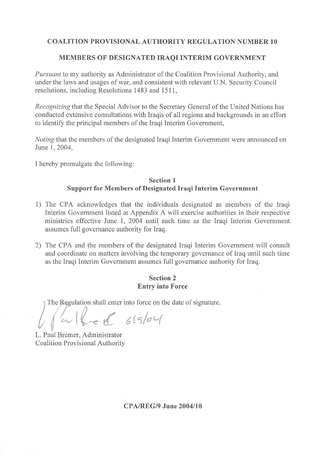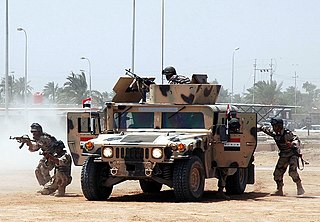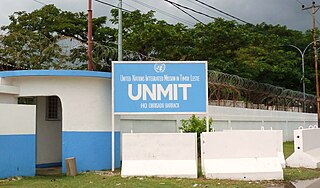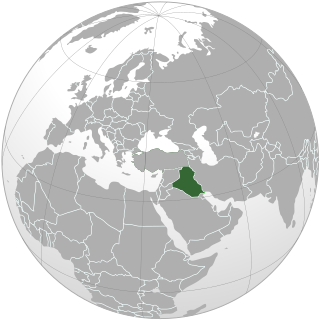
United Nations Security Council resolution 1546, adopted unanimously on 8 June 2004, after reaffirming previous resolutions on Iraq, the Council endorsed the formation of the Iraqi Interim Government, welcomed the end of the occupation and determined the status of the multinational force and its relationship with the Iraqi government.

United Nations Security Council Resolution 1700, adopted unanimously on August 10, 2006, after recalling previous resolutions on Iraq, particularly resolutions 1500 (2003), 1546 (2004), 1557 (2004) and 1619 (2005), the Council extended the mandate of the United Nations Assistance Mission in Iraq (UNAMI) for a further period of twelve months until August 10, 2007.

United Nations Security Council Resolution 1723, adopted unanimously on November 28, 2006, after recalling previous resolutions on Iraq, the Council extended the mandate of the multinational force until the end of 2007.

The United Nations Assistance Mission for Iraq (UNAMI) was formed on 14 August 2003 by United Nations Security Council (UNSC) Resolution 1500 at the request of the Iraqi government to support national development efforts.

United Nations Security Council Resolution 1919, adopted unanimously on April 29, 2010, after recalling resolutions 1674 (2006), 1894 (2009) on the protection of civilians in armed conflict, 1612 (2005) and 1882 (2009) on children in armed conflict, 1502 (2003) on the protection of humanitarian and United Nations personnel, and 1325 (2000), 1820 (2008), 1888 (2009), and 1889 (2009) on women, peace, and security, the Council extended the mandate of the United Nations Mission in Sudan (UNMIS) until April 30, 2011 with the intention of renewing it further if necessary.

United Nations Security Council resolution 1436, adopted unanimously on 24 September 2002, after recalling all previous resolutions on the situation in Sierra Leone, the Council extended the mandate of the United Nations Mission in Sierra Leone (UNAMSIL) for a further six months beginning on 30 September 2002.

United Nations Security Council resolution 1500, adopted on 14 August 2003, after reaffirming previous resolutions on Iraq, particularly Resolution 1483 (2003), the council established the United Nations Assistance Mission in Iraq (UNAMI) and welcomed the creation of the Iraqi Governing Council.
United Nations Security Council Resolution 1943, adopted unanimously on October 13, 2010, after reaffirming all resolutions on the situation in Afghanistan and terrorism, including resolutions 1267 (1999), 1368 (2001), 1373 (2001), 1386 (2001), 1510 (2003), 1822 (2008), 1833 (2008), 1890 (2009), 1904 (2009) and 1917 (2010), the Council extended the authorisation of the International Security Assistance Force (ISAF) operating in the country for a period of one year.

United Nations Security Council resolution 1557, adopted unanimously on 12 August 2004, after reaffirming previous resolutions on Iraq, particularly resolutions 1500 (2003) and 1546 (2004), the Council extended the mandate of the United Nations Assistance Mission in Iraq (UNAMI) for a further period of twelve months. The resolution was drafted by the United Kingdom and United States.

United Nations Security Council Resolution 1574, adopted unanimously at a meeting in Nairobi, Kenya, on 19 November 2004, after recalling resolutions 1547 (2004), 1556 (2004) and 1564 (2004), the council welcomed political efforts to resolve the conflicts in Sudan and reiterated its readiness to establish a mission to support the implementation of a Comprehensive Peace Agreement.

United Nations Security Council Resolution 1590, adopted unanimously on 24 March 2005, after recalling resolutions 1547 (2004), 1556 (2004), 1564 (2004), 1574 (2004), 1585 (2005) and 1588 (2005) on the situation in Sudan, the Council established the United Nations Mission in Sudan (UNMIS) for an initial period of six months.

United Nations Security Council Resolution 1592, adopted unanimously on 30 March 2005, after recalling all previous resolutions on the situation in the Democratic Republic of the Congo, including Resolution 1565 (2004), the Council extended the mandate of the United Nations Mission in the Democratic Republic of Congo (MONUC) until 1 October 2005.

United Nations Security Council resolution 1610, adopted unanimously on 30 June 2005, after recalling all previous resolutions on the situation in Sierra Leone, the Council extended the mandate of the United Nations Mission in Sierra Leone (UNAMSIL) for a final six months until 31 December 2005.

United Nations Security Council Resolution 1969 was adopted unanimously on February 24, 2011; after reaffirming resolutions 1599 (2005), 1677 (2006), 1690 (2006), 1703 (2006), 1704 (2006), 1745 (2007), 1802 (2008), 1867 (2009) and 1912 (2010) on the situation in East Timor (Timor-Leste), the Council decided to extend the mandate of the United Nations Integrated Mission in Timor-Leste (UNMIT) for a year, until February 26, 2012.

United Nations Security Council resolution 1619, adopted unanimously on 11 August 2005, after reaffirming previous resolutions on Iraq, particularly resolutions 1500 (2003), 1546 (2004) and 1557 (2004), the Council extended the mandate of the United Nations Assistance Mission in Iraq (UNAMI) for a further period of twelve months.

United Nations Security Council Resolution 1702, adopted unanimously on August 15, 2006, after recalling resolutions 1542 (2004), 1576 (2004), 1608 (2005) and 1658 (2006) on the situation in Haiti, the Council extended the mandate of the United Nations Stabilisation Mission in Haiti (MINUSTAH) until February 15, 2007.

United Nations Security Council Resolution 2001, adopted unanimously on July 28, 2011, after recalling all previous resolutions on the situation in Iraq, including resolutions 1500 (2003), 1546 (2004), 1557 (2004), 1619 (2005), 1700 (2006), 1770 (2007), 1830 (2008), 1883 (2009) and 1936 (2010), the Council extended the mandate of the United Nations Assistance Mission in Iraq (UNAMI) for a further period of 1 year.

United Nations Security Council Resolution 1830 was unanimously adopted on 7 August 2008.
United Nations Security Council Resolution 1770 was unanimously adopted on 10 August 2007.

United Nations Security Council Resolution 1883 was unanimously adopted on 7 August 2009.


















